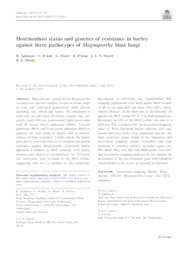Host/nonhost status and genetics of resistance in barley against three pathotypes of Magnaporthe blast fungi.
Host/nonhost status and genetics of resistance in barley against three pathotypes of Magnaporthe blast fungi.
Author(s): AGHNOUM, R; BVINDI, C.; MENET, G.; D’HOOP, B.; MACIEL, J. L. N.; NIKS, R. E.
Summary: Blast disease, caused by the Magnapor the oryzae/griseaspecies complex, occurs in a wide rangeof wild and cultivated gramineous plant species including rice, wheat and barley. We inoculated a collection of cultivated (Hordeum vulgaressp.vul-gareL.) and wild (ssp.spontaneum) barley accessions with M. oryzae Oryzapathotype (MoO),Triticumpathotype (MoT) and Pennisetumpathotype (MsP) to quantify the host status of barley, and to identify sources of blast resistance. Unlike wheat, the barleygene pool is rich with sources of complete and partialresistance againstMagnaporthe. Cultivated barleyappeared a nonhost to MsP, whereas wild barleyshowed some degree of susceptibility. All 153 testedrice accessions were resistant to the MoT isolate,suggesting that rice is nonhost to this pathotype.Inoculation of L94/Vada and Vada/SusPtrit RILmapping populations with MoO and/or MoT isolatesofM. oryzaeindicated one large effect QTL, desig-nated as Rmoq1, on the short arm of chromosome 7Hagainst the MoT isolate PY 67.1 in both populations.Resistance in L94 to the MoO isolate was due to adifferent QTL, located at 5H. An association mappingpanel of West European barley cultivars also sug-gested that most QTLs were pathotype specific. Sixblast resistance genes found in the biparental andassociation mapping studies coincided with mappositions of powdery mildew resistance genes viz.Mlt,Mla6,Mlg,mlo,Mlj, andMlhbgenes. Our QTLand association mapping analyses do not support theassociation of themloresistance gene with enhancedsusceptibility toM. oryzaeas reported in literature. KeywordsAssociation mappingBarleyBlastdiseaseGWASMagnaporthe oryzaemloQTLmapping
Publication year: 2019
Types of publication: Journal article
Unit: Embrapa Wheat
Observation
Some of Embrapa's publications are published as ePub files. To read them, use or download one of the following free software options to your computer or mobile device. Android: Google Play Books; IOS: iBooks; Windows and Linux: Calibre.
Access other publications
Access the Agricultural Research Database (BDPA) to consult Embrapa's full library collection and records.
Visit Embrapa Bookstore to purchase books and other publications sold by Embrapa.

